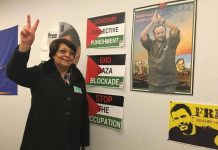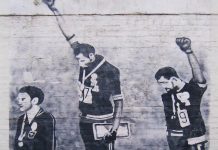
Den afro-amerikanske aktivist Angela Davis er født 26. januar 1944 i Birmingham, Alabama (Berømt by for borgerrettighedskampen i 60’erne / City famous for civil rights struggles in the 60′, see article at Wikipedia.org).
Den 4. juni 1972 frikendes hun efter ca. 1½ års retssag** – og stor international solidaritetskampagne – for anklagerne for at have forsynet Jonathan Jackson (Soledad-brødrene) med våben i retssalen i San Raphal, Californien, hvor politiet myrdede brødrene Jackson. Angela Davis har været aktiv i nationale kampagner for politiske fanger og omkring fængselsforhold. Indtil 2008 var hun professor på Californiens Universitet. Allerede i de tidligere 60’ere læste hun på universitet hos den tyske filosof og politiske teoretiker, Herbert Marcuse.
** Se nedenfor om offentlig tale 9. juni 1972 On Prison Abolition
Indhold / Content:
- Biografisk / Bibliographical
- Articles, books, interviews
- Videoer
- Bøger på dansk / Books in Danish
- Se også / See also links
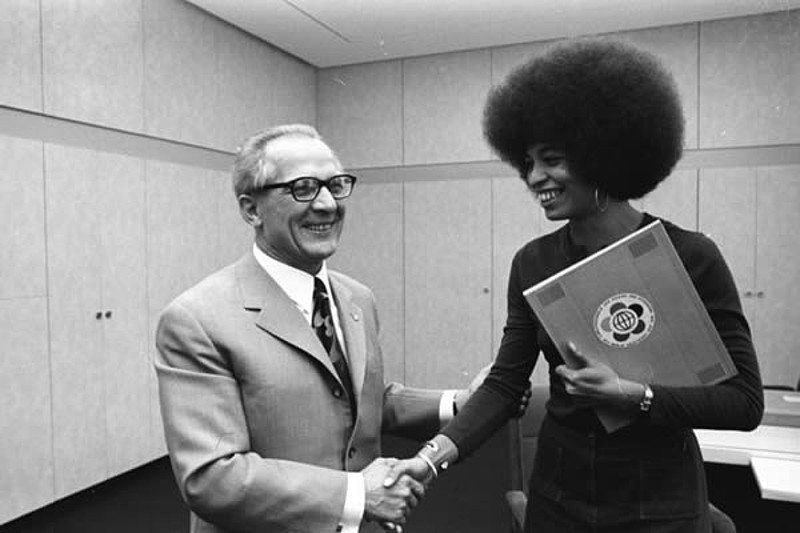
Biografisk/Biographical:
- Angela Yvonne Davis. Af Torkil Lauesen (Leksikon.org). Med en del links til relaterede emner.
- Borgerrettigheder bliver systematisk tilsidesat af det industrielle fængselskompleks i USA (Autonom Infoservice, 7. januar 2014). Interview [biografisk] med Angela Davis.
- Angela Davis (Wikipedia.org). Large English article with many links, also to shorter Scandinavian articles/Stor engelsk artikel med mange links, også til korte danske & norske artikler.
- Angela Davis (Spartacus Educational)
- Angela Davis. By Katherine E. Horsley (FemBio, 2009). Biographies + Literature & Sources.
- #BornThisDay: Revolution and renewal with activist, Angela Davis. By Stephen Rutledge (WOW Report, January 26, 2019). “Constantly speaking out against racism, sexism, the prison industrial complex, war, and the death penalty, among other issues …” Incl. posters & videos.
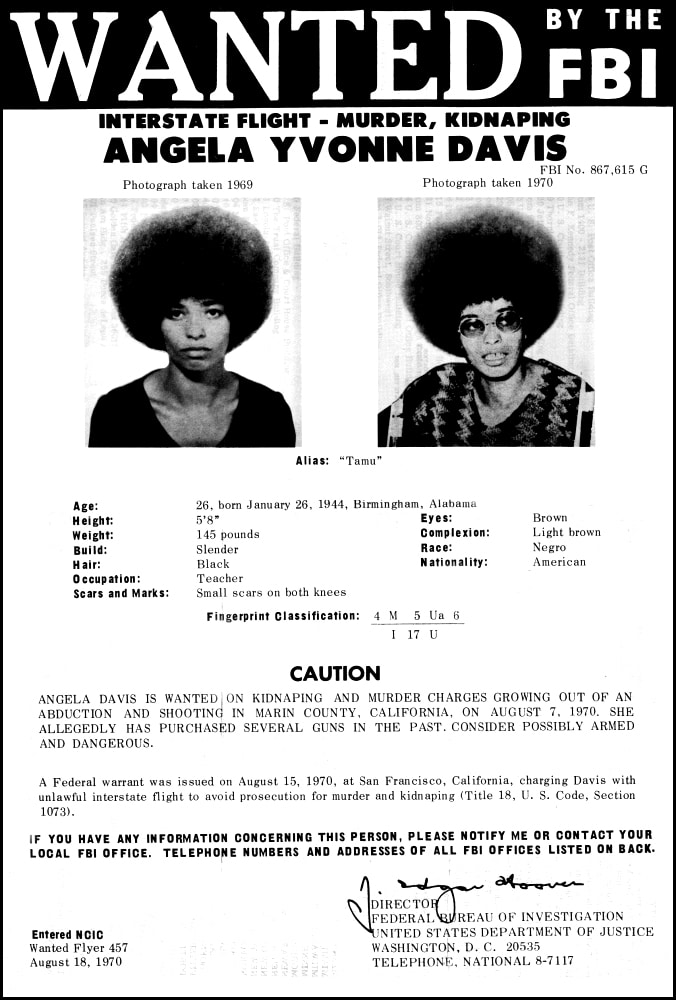
Articles, books, interviews:
Om Angela Davis, svart radikal kvinna (pdf) (Marxistarkiv.se, 8. marts 2019, 4 s.)
Som en hyllning till Internationella kvinnodagen publicerar vi två texter om den svarta kvinnliga radikala aktivisten Angela Davis.
Det politiske ikon Angela Davis gør status: Uden håb er der ingen grund til at kæmpe. Af Lise Benthin Præstgaard (Information.dk, 18. juni 2022, s.14-17). “50 år efter Angela Davis blev løsladt fra dødsgangen for en forbrydelse, hun ikke havde begået, ser hun tilbage på sit liv som aktivist. Information har mødt hende til en snak om den kamp, hun stadig kæmper mod racisme, antifeminisme og elefanten i rummet – kapitalisme.” Under betalingsmur.
Angela Davis landede på Egeskov Slot, og udfordrede de pæne middelklasse-rammer. Af Veronika Ahrensbøll Schultz (Solidaritet.dk, 12. juni 2022). “Torsdag d. 2. juni var det antiracistiske venstrefløjsikon Angela Davis sat i stævne til en samtale om abolitionisme på Heartland Festival. I et mørkt telt langt fra slotshavens romantik fortalte Davis om, hvordan fængsler kan afskaffes, om aktivist-berømmelse over for kollektiv organisering …”
USA: ”Jeg tror, at der findes andre måder end afstraffelse og fængsel” (Autonom Infoservice, 29. august 2019). Om USA’s fængselsindustri + interview med Angela Davis, feminist og “Black Woman Revolutionary”, med noter og videoer (oversat fra Jungle World, nr. 51, 2014).
Video: The Freedom Struggle in 2020: Angela Davis on protests, defunding police & toppling racist statues. Interview with Amy Goodman: On the Black Lives Matter Movement (DemocracyNow.org, 31 December 2020; 18:36 min.). “In a Democracy Now! special, we revisit our June 2020 interview with the legendary activist and scholar Angela Davis about the uprising against police brutality and racism launched in May after the police killing of George Floyd in Minneapolis” + ‘a rush transcript’.”
Angela Davis’s life’s work is exposing state repression. By Cecilia Sebastian (Jacobin, October 27, 2024). “Angela Davis became world-famous in her twenties when the FBI put her on its most wanted list. Since securing her freedom, Davis has worked for half a century to expose the practice of repression in formally democratic states like the US.”
Angela Davis exposed the injustice at the heart of the criminal justice system. By Joel Whitney (Jacobin, April 1, 2023). “In 1970, Angela Davis was arrested on suspicion of murder. She was already the victim of red-baiting witch hunts led by conservatives, but the trial — and her eventual victory — proved to everyone that the justice system was corrupt.”
Angela Davis on reissue of her 1974 autobiography, editor Toni Morrison, Internationalism & More (DemocracyNow, January 19, 2022, 5 min., with transcript). “What struck me was how much has changed,” says Davis, on her process of publishing the new edition. Both how much has changed and how little has changed.”
During the 1971 prosecution of Angela Davis, I fought the law — and I won. By Michael Myerson (Jacobin, June 29, 2021). “When Angela Davis was arrested after two months on the lam in 1971, Michael Myerson interviewed her and a codefendant in jail — turning him into a prosecution’s witness. He was now in a tough spot: Could he defy the prosecution without going to jail for perjury? Luckily, he figured out how.”
Angela Davis. By Nelson George (New York Times Magazine, October 19, 2020). A lengthy profile: “Before the world knew what intersectionality was, the scholar, writer and activist was living it, arguing not just for Black liberation, but for the rights of women and queer and transgender people as well.”
From segregation to black liberation. By Naima Omar (Socialist Review, Issue 450, October 2019). “This is the first of three columns looking at the life, politics and activism of Angela Davis, a living icon for revolutionaries.”
Part 2: America’s most wanted (Issue 451, November 2019). “… how her arrest made her an international symbol of resistance.”
Part 3: Angela Davis: An icon and an inspiration (Issue 454, February 2020). “How Davis developed her own contributions to the theory and practice of socialism and revolution in the modern world”.
Also as a pamphlet: The Revolutionary Politics of Angela Davis. By Naima Omar (Socialist Worker, 2021, 38 p.). (Se omtale på Modstand.org)
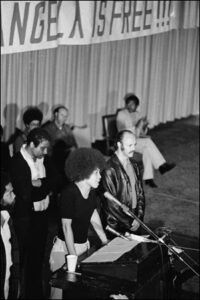
**On Prison Abolition: Angela Y. Davis: Speech delivered at the Embassy Auditorium, Los Angeles, California – June 9, 1972 (America Radio Works)
Angela Davis: Relevant as ever after thirty years. By Alice Ragland (Against the Current, Issue 199, March-April 2019). “Active and influential in international freedom struggles for nearly six decades, her speeches and writings have valuable lessons to teach us about the major injustices that we face in this era of heightened racism, xenophobia, and reactionary violence.” See also David Finkel: The activism of Angela Davis (ibid.).
Political prisoners, prisons and black liberation + Prison interviews with Angela Y. Davis (Verso, Blog, 21 February 2018). Extract from If They Come in the Morning …: Voices of Resistance. Edited by Angela Y. Davis (Verso, 2016, 288 p.). “With race and the police once more burning issues, this classic work from one of America’s giants of black radicalism has lost none of its prescience or power.“
Our struggles link us together (SocialistWorker.org, March 16, 2016). Review of Angela Davis, Freedom Is a Constant Struggle: Ferguson, Palestine and the Foundations of a Movement (Haymarket Books, 2016, 180 p.). “One of the best-known figures from a previous era of radicalization has collected her insights into a new book. recommends them to a new generation.”
Angela Davis: Black liberation and socialism. By Nick Stone (Permanent Revolution, 2 November 2008; online at Internet Archive). Review of Angela Davis: an autobiography (The Women’s Press, 1990). “Her life and work remain a key talking point for socialists and her life remains an inspiration.”
Are Prisons Obsolete? (pdf). By Angela Y. Davis (Seven Stories Press, 2003, 128 pages; online at The Anarchist Library). “It is my hope that this book will encourage readers to question their own assumptions about the prison.”
Interview Angela Davis (PBS/Frontline, 1998). “Looks back on the sixties’ struggles and why ‘the movement crashed’. She discusses the choices that faced black activists at the time – such as pan-Africanism and the Panthers’ radical economic program – and evaluates the legacy of each.”
The approaching obsolescence of housework: A working-class perspective (Marxists Internet Archive). Chapter 13 in Angela Davis, Women, Race and Class (1981). “The abolition of housework as the private responsibility of individual women is clearly a strategic goal of women’s liberation.
Change the political prisoners! (pdf) (Solidarity for Workers Power, Vol.7, No.4, 1972, p.7-9). “We welcome Angela Davis’ release … while documenting her outrageous utterances about the Czech political prisoners …”
See also: How Angela Davis became an icon in East Germany (Deutsche Welle, 12 October 2020). “In the US, Davis was regarded by many as an enemy of the state, but in the GDR, the civil rights activist was a superstar. What role did she actually play in East Germany?”
Videoer:
Slavery and the Prison Industrial Complex (YouTube.com, 2:03:11 hours, Davis 7 min. -). Angela Davis 5th Annual Eric Williams Memorial Lecture at Florida International University, 9-19-2003; Speaker: Angela Davis, Professor in History of Consciousness and Chair of Women’s Studies, University of California, Santa Cruz.
Angela Davis speaks in support of Mumia Jamal. (Youtube, 10:33)
Om Mumias sag, se Tidslinjen 9. december 1981
Bøger på dansk:
- Kvinder, race og klasse. Af Angela Davis (Informations Forlag, 2022, 440 sider).
Se anmeldelse af Ida Elmdal Thagesen: Genoptryk af klassiker minder nutidsdanskeren om betydningen af køn, race og klasse (Altinget.dk, 2. juni 2022). - Angela Davis: en selvbiografi. Af Angela Davis (Gyldendal, 1975, 361 sider).
- Hvis de kommer om morgenen: modstandsrøster. Af Angela Davis, Ruchell Magee, Soledad-brødrene (Tiden, 1972, 176 sider).
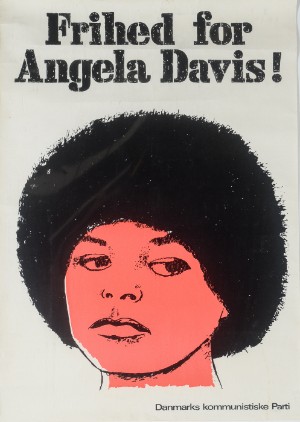
Se også: / See also:
- Om Soledad-brødrene, se artikel på Wikipedia.org + Luke Pickrell: The murder of a Soledad Brother (SocialistWorker.org, August 21, 2018).
- Linkboxen Black Power: Historie og personer (Socialistisk Bibliotek)
- Tidslinjen 29. juli 1979, om Herbert Marcuse (Socialistisk Bibliotek)
















